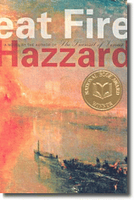 Ward Just named six books for The Week magazine that he admires for their “'autumnal' quality, the sense that spring’s return is no sure thing."
Ward Just named six books for The Week magazine that he admires for their “'autumnal' quality, the sense that spring’s return is no sure thing."Here's half of his list:
A Very Long Engagement by Sebastien Japrisot
A beautiful war novel and a transcendent love story, animated by the remarkable Mathilde, who doubts that her fiancé was killed in the line of duty and sets out to prove it. Once begun, this book cannot be put down. Wonderfully translated from the French by Linda Coverdale.
What We Talk About When We Talk About Love by Raymond Carver
Carver knew a great deal about many things. But mostly he knew about living in America—expectations, loss, the taste of bourbon in the morning, how we age, how we quarrel, how we make up or fail to make up. In short, how we survive.
The Great Fire by Shirley Hazzard
The fire in question is the Second World War. The time is 1947, the setting Asia, and a reckoning of sorts is at hand when war hero Aldred Leith proposes to record the effects of the bomb at Hiroshima. A beautifully observed love story, a meditation on war and its discontents, the novel can be summed up in its last line: “Many had died. But not she, not he; not yet.”
Click here to read about Just's other three recommended titles.
Just’s new novel, Forgetfulness, has just been published.
Ward Just is the author of fourteen previous novels, including the National Book Award finalist Echo House and An Unfinished Season, winner of the Chicago Tribune’s Heartland Award. In a career that began as a war correspondent for Newsweek and the Washington Post, Just has lived and written in half a dozen countries, including Britain, France, and Vietnam. His characters often lead public lives as politicians, civil servants, soldiers, artists, and writers. It is the tension between public duty and private conscience that animates much of his fiction, including Forgetfulness.
Ron Charles reviewed Forgetfulness for the Washington Post:
Just’s new novel, Forgetfulness, has just been published.
Ward Just is the author of fourteen previous novels, including the National Book Award finalist Echo House and An Unfinished Season, winner of the Chicago Tribune’s Heartland Award. In a career that began as a war correspondent for Newsweek and the Washington Post, Just has lived and written in half a dozen countries, including Britain, France, and Vietnam. His characters often lead public lives as politicians, civil servants, soldiers, artists, and writers. It is the tension between public duty and private conscience that animates much of his fiction, including Forgetfulness.
Ron Charles reviewed Forgetfulness for the Washington Post:
Ward Just's thrillers are so subtle that they risk sounding dull, as though he's engaged in a battle against excess and bombast. The movement--Marshal Zeringuein his stories is slight, but the forces at work are tremendous. That muted power has never been more unsettling than in his new novel, a response to Sept. 11 that stretches the boundaries of an already voluminous genre. Even his wistful title, Forgetfulness, signals that Just is exploring something very different from what we find in John Updike's bestselling Terrorist. This story takes place deep in the shadow of Sept. 11, but it contains neither the raw bitterness of Ken Kalfus's A Disorder Peculiar to the Country nor the tender sadness of Jonathan Safran Foer's Extremely Loud and Incredibly Close. Instead, Just tries to portray the state of mind Emily Dickinson described when she wrote, "After great pain a formal feeling comes -- / The nerves sit ceremonious like tombs." (more)







